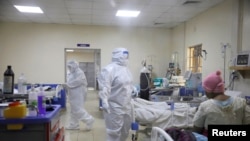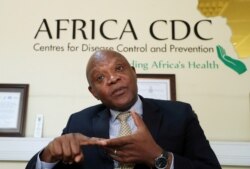As a second wave of coronavirus approaches, Africa has a plan, says the continent’s top health official.
In recent weeks, the continent has started to distribute 2.7 million rapid antigen tests. By mid-2021, health officials hope to vaccinate 60 percent of the continent’s population with one of the several promising new vaccines.
Now, says Dr. John Nkengasong, director of the Africa Centers for Disease Control and Prevention, it’s up to the continent’s leaders to try to make that happen.
“That will also require that we mobilize up to about $10 to $12 billion including the cost of buying the vaccines and the cost of delivering the vaccines,” he told journalists on Thursday by teleconference. “So that is the 60 percent mark that we really want to achieve. And I just really want everyone on this platform and our partners to understand that as a continent that is aspiration and our goal.”
Dr. Nkengasong added that experts are working to bring more clinical trials to the continent. But, he stressed, as COVID-19 numbers rise in some countries — notably, South Africa, Kenya and Algeria — the continent’s health facilities appear to be weathering the onslaught.
“We are not seeing hospitals being overwhelmed with COVID patients,” he said. “That is clearly what the situation is. We were very encouraged that during the first wave we didn’t see that kind of overwhelming, which we were very worried and concerned with.
“That doesn't tell us that the second wave will not happen. It only tells us that we have to prepare, and prepare using the three T’s — which is the tests, the tracing and the treatment.”
As the continent approaches end-of-year holidays, Nkengasong underscored one piece of advice:
“Do not relent in wearing masks,” he said. “One message that is emerging across the visits we are conducting across the continent is that people are not masking enough. And in some settings, absolutely it seems like they are not masking at all. And that is extremely dangerous.
“My worry and fear is that the sacrifices and gains that were made since the beginning of this year ... those gains that were made in terms of bringing the pandemic down to where we were in October could be completely wiped out if we relent at this point.”





